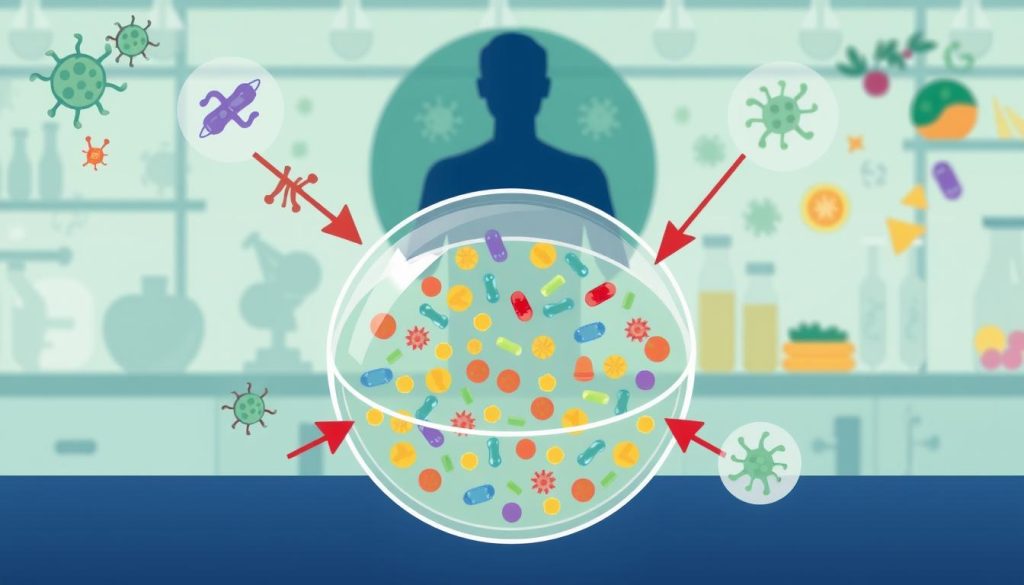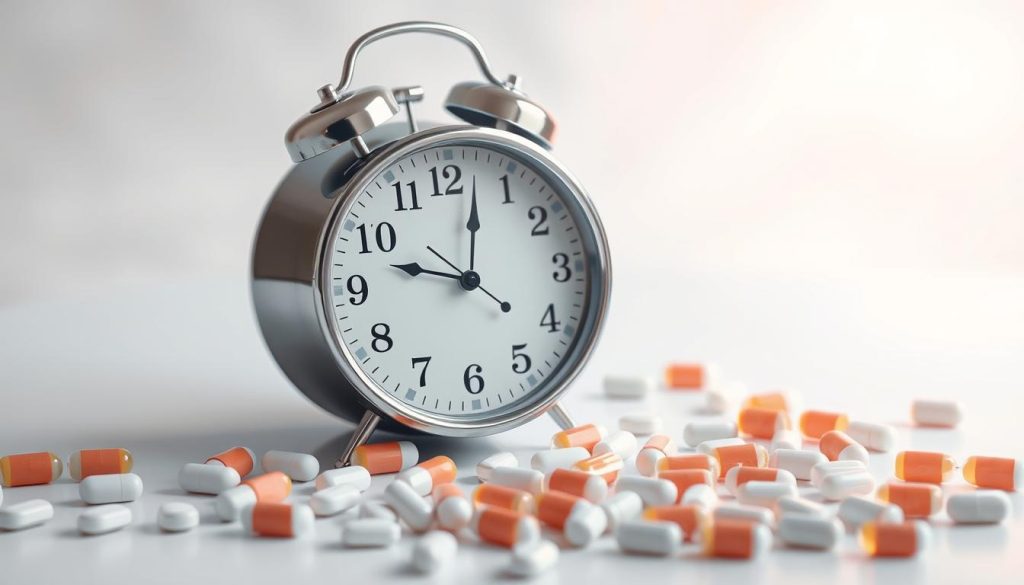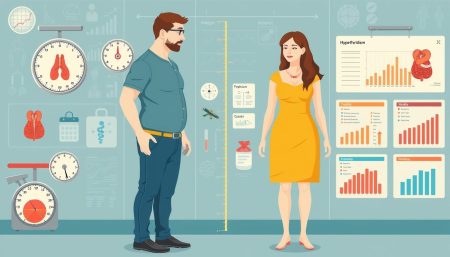Antibiotics are key in fighting bacterial infections. Many wonder, “how long does it take for antibiotics to kick in?” To answer this, we need to look at the antibiotic treatment timeline and what affects it. This intro explains what you can expect when you start taking antibiotics.
Recovery starts when antibiotics enter your body. But, how soon you feel better depends on several things. These include the infection type, the antibiotic type, and how your body reacts. Knowing this helps manage your expectations and understand the treatment better.
We’ll dive into the antibiotics effectiveness timeline in the next sections. You’ll learn about treatment progress and when to see a doctor if symptoms don’t go away. This guide aims to help you understand your antibiotic treatment and recover safely and quickly.
Understanding Antibiotics and Their Purpose
Antibiotics are key in modern medicine, fighting bacterial infections. They help us recover fast by killing harmful bacteria. It’s important to know how long they work and how long it takes to see results.
The Role of Antibiotics in Treating Infections
Antibiotics either kill or stop bacteria from growing. This is key to stopping infections from spreading. It lets our immune system heal.
The antibiotics duration of action makes sure they work long enough. This reduces bacteria to almost none.
Different Types of Antibiotics and Their Uses
There are many types of antibiotics, each working differently. For example, penicillins and cephalosporins stop cell wall growth. Macrolides stop protein making. Each type works best for certain infections.
- Penicillins – Often used for skin and respiratory infections.
- Cephalosporins – Applicable in surgical prophylaxis and severe infections.
- Macrolides – Typically prescribed for respiratory infections and some sexually transmitted diseases.
Knowing how each antibiotic works helps doctors pick the best one. This ensures the best treatment with fewer side effects.
Factors Influencing Antibiotic Effectiveness
It’s important to know what affects how well antibiotics work. The antibiotics onset of action and patient variation in response times are key. They help doctors guess how fast a patient will get better.

Everyone’s body is different when it comes to antibiotics. This is because of genetics, health, and other medicines. These differences can make some people get better faster than others.
- Genetic Factors: Some people naturally process drugs faster or slower. This can change how quickly antibiotics start working.
- Health Status: Problems like liver or kidney disease can slow down how well the body uses antibiotics.
- Age: Older people often have slower metabolisms. This can make antibiotics take longer to work.
- Interaction with Other Medications: Other medicines can affect how well antibiotics work. This can change how fast a patient gets better.
Doctors can use this knowledge to tailor treatments for each patient. This helps in setting realistic goals and might mean changing doses or plans to fit each person’s needs.
Initial Response to Antibiotics: What to Expect
Starting antibiotics can lead to different responses based on the infection and your health. When do antibiotics start working? Many patients look forward to feeling better quickly.
Early experiences with antibiotics can show how healing progresses. Some symptoms may get better fast, while others take longer. Knowing what to expect can ease worries about treatment progress.
- Day 1-2: You might start to notice a decrease in symptoms such as fever and swelling as the antibiotics begin to target and reduce the bacterial load.
- Day 3-4: Improvement continues as major symptoms begin to subside more noticeably.
- Day 5-7: By this stage, if the antibiotics are effective, significant improvement is often perceived, prompting a sense of recovery.
It’s important to watch how your body reacts to the medication early on. Any side effects or unusual symptoms should be told to your healthcare provider. Understanding when do antibiotics start working means noticing symptom improvement and ensuring the medication is well-tolerated.
Always finish the full treatment, even if you feel better sooner. This helps avoid antibiotic resistance.
How Long Until Antibiotics Work in Your System
Starting antibiotics means knowing how long they take to work. This is key for managing your hopes and checking progress. We’ll explore how antibiotics move from being taken to fighting infections in your body.
After you take antibiotics, they go through your body before they can fight infections. How fast and well they work depends on the antibiotic and the infection. They first get into your blood, then reach the infection site, and start working on the bacteria.
- Absorption: This is the first stage where the drug enters the bloodstream. Depending on whether the antibiotics are taken orally, injected, or administered in another form, the absorption rate can differ significantly.
- Distribution: After entering the bloodstream, antibiotics are carried to the site of the infection. Their distribution is influenced by blood flow, body mass, and the permeability of the cells in the infected area.
- Action: Antibiotics work by either killing bacteria or inhibiting their growth. The time it takes to see results from this action can vary, and monitoring by healthcare professionals may adjust dosage according.
To understand the timeline for antibiotics to take effect, look at this table:
| Stage | Process | Estimated Time Frame |
|---|---|---|
| 1 | Absorption | 1-2 hours post-ingestion |
| 2 | Distribution | 2-6 hours post-ingestion |
| 3 | Action | Varies greatly (6 hours to several days) |
To guess how long until antibiotics work in your system, stick to your treatment plan. Talk to your doctor if you don’t see improvement as expected.
Everyone reacts differently to antibiotics. While they might start working in hours, you might not see results right away. This depends on the infection’s severity and your health.
Antibiotics Duration of Action: A Detailed Look
Understanding the antibiotics therapeutic effect timeline is key. The time an antibiotic works varies based on several factors. This part will walk you through the journey of antibiotics from the start to the end of treatment.
From Prescription to Progress: Phases of Antibiotic Action
The antibiotics therapeutic effect timeline has several important phases. These include absorption, distribution, action, and elimination. Each phase is vital for the antibiotic’s success in fighting infections.
- Absorption: This is when the antibiotic gets into the bloodstream. It’s essential for reaching the infected area.
- Distribution: Here, the antibiotic spreads throughout the body, aiming for the infection site.
- Action: This is when the antibiotic starts to kill or stop bacteria growth.
- Elimination: In the last phase, the antibiotic is broken down and leaves the body.
Factors That Affect the Duration of Antibiotic Treatments
Many things can change how long an antibiotic works. These include the patient, the bacteria, and the antibiotic type. Let’s look at each:
| Factor | Impact on Antibiotics Duration |
|---|---|
| Body metabolism | Varies from person to person, affecting how quickly antibiotics are processed |
| Infection severity | More severe infections might require prolonged antibiotic therapy |
| Type of antibiotic | Certain antibiotics have a naturally longer half-life, extending their duration in the system |
| Bacterial resistance | Resistant strains may necessitate extended treatment courses or alternative therapies |
Timeline for Antibiotics to Take Effect
When you start taking antibiotics, it’s important to know how long they take to work. This time can change a lot based on the infection and the antibiotics. Here, we’ll look at how long it usually takes for antibiotics to start working on common infections.
Things like how bad the infection is, your health, and following the treatment plan are key. Below, you’ll find a general idea of when you might start feeling better.
| Type of Infection | Common Antibiotics Used | Expected Time to Notice Improvement |
|---|---|---|
| Strep Throat | Penicillin, Amoxicillin | 24-48 hours |
| Urinary Tract Infection | Ciprofloxacin, Trimethoprim | 1-3 days |
| Skin Infections | Cephalexin, Clindamycin | 48-72 hours |
| Respiratory Infections | Azithromycin, Doxycycline | 2-5 days |
Note: You should start feeling better within these times; but if not, see a doctor. This is to make sure the antibiotics are right for your infection.
- Always follow the dosage instructions provided by your healthcare provider.
- Never skip doses, even if you start feeling better before completing the course of treatment.
- Keep track of any side effects and report severe reactions to a medical professional.
Knowing how long antibiotics take to work helps manage your expectations. It’s important to talk to your doctor about any concerns. This ensures you get the best care for your infection.
Antibiotics Onset of Action: Recognizing the Signs
When you start taking antibiotics, it’s important to know when they start working. This helps you understand how long it takes for them to show results. The time it takes can vary based on the infection and how your body reacts.
Physical Indicators of Antibiotics Working
As antibiotics fight the infection, you might notice some changes. These can include a drop in fever, less pain, and swelling that goes down. Seeing these signs means the treatment is likely working well, matching the expected timeline.
The Importance of Completing the Full Course
Even if you start feeling better fast, it’s key to finish the antibiotics as directed. Stopping early can cause the infection to come back, possibly worse. Finishing the treatment ensures you get the most out of the antibiotics, keeping you healthy.
| Sign | Expected Time to Notice |
|---|---|
| Decrease in Fever | 1-3 days |
| Reduction in Pain | 24-48 hours |
| Decrease in Swelling | 2-5 days |
Typical Course of Treatment with Antibiotics
Knowing the antibiotic treatment timeline is key for those taking or giving antibiotics. This part will give a basic idea of how long and how much antibiotics are usually given. It will also look at what affects these times.
The time antibiotics are used can change a lot. It depends on the infection, the person’s health, and the bacteria’s resistance. But, there’s a general plan for starting, giving, and checking how well the treatment works.
| Infection Type | Typical Duration | Common Antibiotics Used |
|---|---|---|
| Strep Throat | 10 days | Penicillin, Amoxicillin |
| Urinary Tract Infection | 3-7 days | Trimethoprim, Ciprofloxacin |
| Skin Infection | 7-14 days | Cephalexin, Dicloxacillin |
| Pneumonia | 5-14 days | Azithromycin, Levofloxacin |
These numbers are a starting point. Doctors might change the time based on how you’re doing and any side effects. Knowing your antibiotic plan well is important for using antibiotics right.
- Always finish the treatment, even if you feel better.
- Tell your doctor right away if you have any bad reactions.
- Follow your doctor’s advice on when and how to take your medicine.
Following these steps makes sure the treatment works well. It also lowers the chance of antibiotic resistance.
Managing Expectations: When Do Antibiotics Start Working
It’s important to know when do antibiotics start working and how long they take to work. This helps set the right expectations for patients. Many things can affect how soon you feel better.
Patient Variation in Response Times
How fast you respond to antibiotics can differ a lot. The severity of your infection, the antibiotic type, and your health all matter.
The Role of Immune System in Antibiotic Effectiveness
Your immune system’s strength greatly affects how well antibiotics work. A strong immune system can help fight off infections faster.
| Condition | Typical Response Time | Factors Influencing Speed |
|---|---|---|
| Mild bacterial infection | 24-48 hours | Patient’s age, immune health |
| Severe systemic infection | 72 hours or more | Type of bacteria, antibiotic class |
| Localized skin infection | 48-72 hours | Site of infection, antibiotic absorption |
Knowing these details helps both patients and doctors. It sets clear expectations on when do antibiotics start working and how long it might take. This depends on your specific situation and health.
Antibiotics Therapeutic Effect Timeline: A Guide
The antibiotics therapeutic effect timeline is key for both patients and doctors. It shows when antibiotics start to fight infections and help heal. Here’s a step-by-step look at what happens after starting antibiotics.
Knowing when antibiotics start working helps manage hopes and keeps patients on track with treatment. Every step in the antibiotics therapeutic effect timeline is important for fighting off bacterial infections.
- Initial in-take: This is when the medication is first given, setting the stage for its effects.
- Early response phase (1-3 days): Symptoms start to lessen, showing the antibiotics are working.
- Mid-course evaluation (3-7 days): Symptoms should greatly improve; if not, see a doctor.
- Full therapeutic effect (7-14 days): By now, the infection is usually under control or gone, if the antibiotics work.
- Follow-up (After treatment completion): A final check to make sure all symptoms are gone and the infection hasn’t come back.
For more details on each phase, check out health and wellness resources for tips on managing antibiotic effects.
| Phase | Expected Response | Recommended Action |
|---|---|---|
| 1-3 Days | Initial decrease in symptoms | Continue medication, monitor for side effects |
| 3-7 Days | Significant symptom reduction | Keep dosage consistent, reassess if no improvement |
| 7-14 Days | Infection controlled or cleared | Complete the course, even if symptoms have improved |
| Post-Treatment | No symptoms, infection eradicated | Consult healthcare provider for follow-up |
Understanding the antibiotics therapeutic effect timeline helps manage hopes and ensures recovery from bacterial infections.
How Fast Do Antibiotics Work for Common Infections?
Understanding how antibiotics work is key. They fight infections in our bodies. For common problems like urinary tract and respiratory infections, people often wonder when they’ll start feeling better.
Urinary Tract Infections and Antibiotic Response Time
Urinary Tract Infections (UTIs) are common and treated with antibiotics. Symptoms can start to improve in 24 to 48 hours after starting treatment. But, it might take up to a week for antibiotics to fully work, depending on the infection’s severity and your health.
Respiratory Infections: A Timeline for Healing
Respiratory infections, like bronchitis or pneumonia, react differently to antibiotics. People might start feeling better in two to three days. But, it’s important to finish the full course of antibiotics to get rid of all bacteria. Not finishing can slow down recovery and cause more problems.
What if Antibiotics Don’t Seem to Work?
When you’re taking antibiotics, it’s important to watch how they work. Sometimes, antibiotics don’t seem to help as expected. We’ll look at why this might happen and when you should talk to your doctor.
Exploring Reasons for Lack of Improvement
Antibiotics usually start working fast. But, some things can make them less effective. It’s key to make sure the antibiotic is right for the infection.
Bacterial resistance is another big problem. It can make antibiotics not work as well. Also, not taking the antibiotics as directed can slow down improvement. Knowing these reasons can help you understand why you’re not getting better.
When to Consult Your Physician About Antibiotic Efficacy
If you’ve been taking your antibiotics and don’t see any improvement, it’s time to talk to your doctor. If your symptoms get worse, it’s even more important to see them. They can check if you need a different antibiotic or treatment.
Maximizing the Effect of Antibiotics: Tips and Best Practices
Getting the most out of antibiotic treatment is more than just taking the pills. Following best practices for antibiotics can make your treatment more effective. Here are some tips to help you get the best results from your antibiotics.
- Adherence to Prescribed Schedule: Skipping doses or stopping early can lead to antibiotic resistance. It’s important to finish the whole course, even if you start feeling better.
- Proper Dosage: Make sure you’re taking the right amount at the right time. Your healthcare provider will tell you how much and when to take it.
- Avoid Unnecessary Use: Antibiotics only work on bacterial infections. Don’t use them for viral infections like colds or the flu.
- Interaction Awareness: Some foods, medicines, and supplements can affect how well antibiotics work. Talk to your healthcare provider about any possible interactions.
- Lifestyle Considerations: Eating well and staying hydrated helps your body fight off infections. It also helps your body absorb the medicine better.
By following these best practices for antibiotics, you can help your treatment work better. This can reduce the risk of complications and help you recover faster.
Preventing Antibiotic Resistance: The Importance of Adherence
In our final thoughts on antibiotics, we highlight the need to prevent antibiotic resistance. This is a big challenge for today’s medicine. When bacteria change and no longer respond to drugs, it’s a problem. The key is to follow the importance of adherence to antibiotics given by doctors.
Finishing all antibiotics, even if you feel better early, is vital. This helps fight off resistant bacteria. It’s not just about your health but also public safety.
Adhering to antibiotics is a team effort. It ensures these drugs work for everyone in the future. If you stop too soon, not all bacteria die. This can lead to resistant strains spreading.
Healthcare teams and patients must work together. The importance of adherence to antibiotics is huge. Programs, education, and patient care are all key. Together, we can keep antibiotics working and protect our health and future generations.
FAQ
Q: What is the general antibiotics effectiveness timeline?
A: The time it takes for antibiotics to work varies. It depends on the infection and the antibiotic. Usually, people start feeling better in 1 to 3 days. But, it’s key to finish the whole course to get the best results.
Q: What role do antibiotics play in treating infections?
A: Antibiotics fight bacterial infections by killing or stopping bacteria growth. They don’t work on viral infections.
Q: How do different types of antibiotics work?
A: Antibiotics work in different ways. Some, like penicillin, break down the bacterial cell wall. Others, like tetracycline, stop bacteria from growing by blocking protein synthesis.
Q: When do antibiotics start working?
A: Antibiotics can start working in a few hours after the first dose. You might see symptom improvements in 24 to 48 hours. This depends on the infection’s severity and the antibiotic.
Q: What factors can influence the effectiveness of antibiotics?
A: Several things affect how well antibiotics work. These include the bacteria type, how well the antibiotic reaches the infection, and the patient’s health. Also, sticking to the medication schedule and antibiotic resistance play a role.
Q: How long does it take for antibiotics to kick in?
A: Antibiotics can start working in a few hours to a few days. The exact time depends on the antibiotic and the infection.
Q: What are the phases of antibiotic action from prescription to progress?
A: Antibiotics go through several phases. First, the body absorbs them. Then, they distribute, get metabolized, and are excreted.
Q: What indicates that antibiotics are beginning to work?
A: Signs antibiotics are working include lower fever, less pain and inflammation, and feeling better overall.
Q: Why is it important to complete the full course of antibiotics?
A: Finishing all antibiotics is vital. It makes sure all bacteria are killed, prevents the infection from coming back, and reduces antibiotic resistance.
Q: What can cause variations in response times to antibiotic treatment?
A: Different responses to antibiotics can be due to health, infection type, and antibiotic resistance.
Q: How does the immune system affect antibiotic effectiveness?
A: A strong immune system helps antibiotics work by fighting the infection. A weak immune system can slow down treatment and recovery.
Q: What should I do if antibiotics don’t seem to work?
A: If antibiotics don’t help after a few days or symptoms get worse, talk to your doctor. You might need a different antibiotic or more tests.
Q: How can I maximize the effectiveness of antibiotics?
A: To make antibiotics work best, take them as directed, finish the course, avoid alcohol, stay hydrated, and don’t ask for antibiotics when not needed.
Q: Why is adherence to antibiotics critical in preventing antibiotic resistance?
A: Taking all antibiotics as prescribed helps kill bacteria, reducing resistance. This keeps antibiotics effective for everyone.


















